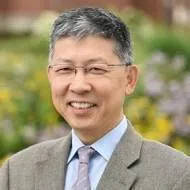Jiang Zemin: The Chinese leader whose achievements outweighed the shortcomings
US academic Zhu Zhiqun gives an assessment of the late former President Jiang Zemin's policies during his time leading China throughout the 1990s and into the early 2000s.
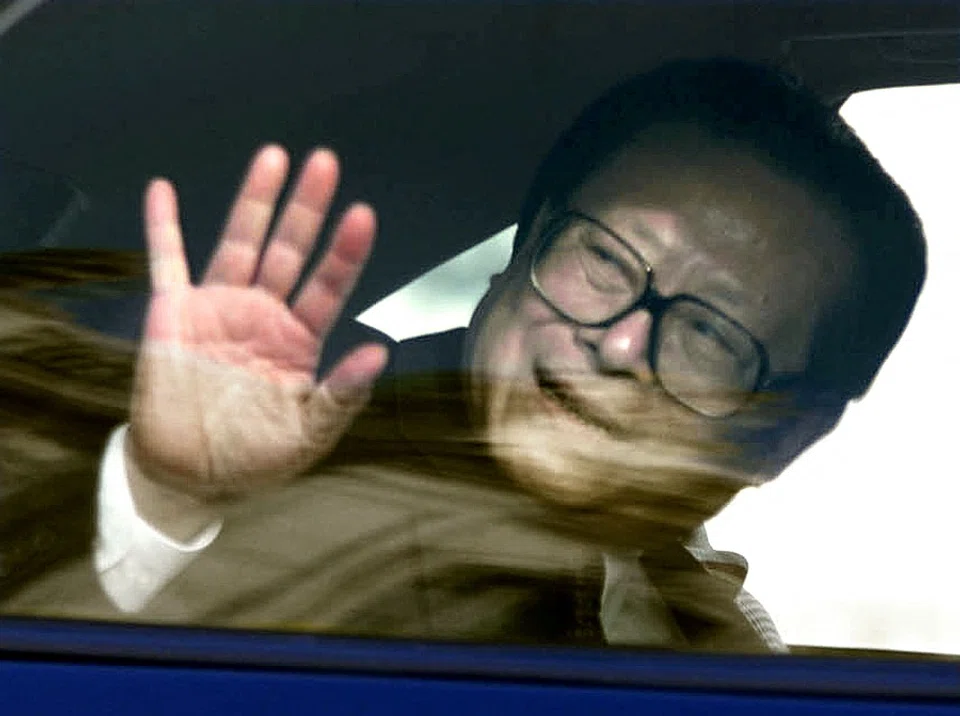
As he was of an advanced age of 96 and had some chronic illnesses, Jiang Zemin's passing was not unexpected. He had led China throughout the 1990s and into the early 2000s, leaving a lasting impact on Chinese politics and foreign relations.
Jiang will be remembered, among other things, as a leader who paved the way for China's emergence as a global power. He had a charismatic personality, which is a rarity among Chinese leaders. One can attribute many of China's achievements as well as problems today to some of the policies initiated during Jiang's tenure.
Several achievements of China stand out as we look back at the 1990s and early 2000s. First, Jiang kept the momentum of reform and opening up after the brief setback of the late 1980s. Second, he and then Premier Zhu Rongji pushed for China's entry into the World Trade Organization (WTO) through reforming the state-owned enterprises while mending fences with the US. Third, his theory of "Three Represents" expanded the membership of the Chinese Communist Party (CCP) and fundamentally changed the party structure while promoting entrepreneurship in China.
Growing into leadership
China was diplomatically isolated and at a crossroads about its future after the 1989 Tiananmen Square crackdown. The policy of reform and opening up initiated a decade earlier by Deng Xiaoping was in jeopardy. Jiang, then party secretary of Shanghai, was handpicked by Deng to be the new CCP general secretary. The engineer-turned-politician was reportedly not taken seriously and viewed as a transitional figure by some party officials as well as foreign observers.
Jiang proved to be shrewd and skilful, outmanoeuvring a myriad of political rivals and consolidating power in the party and military in a few years, culminating in his designation as the core of the PRC's third generation of leadership since 1949. He installed key allies and protégés throughout the party and government and headed the powerful "Shanghai clique" even after retirement.
During his term as the CCP general secretary from 1989 to 2002, China's economic size more than tripled, eventually overtaking Japan's as the world's second largest in 2010.
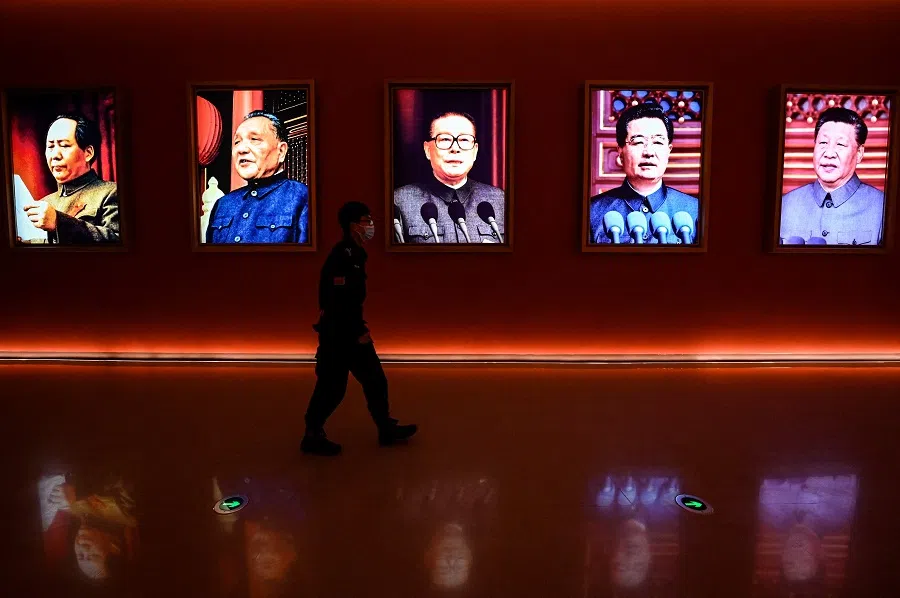
Deng Xiaoping's 1992 Southern Tour jumpstarted the stalled reform. Aided by the capable Zhu Rongji who was first vice-premier and then the premier, Jiang kept the momentum of reform and opening up throughout the 1990s. With a leader in Beijing that appeared to appreciate Western cultures, foreign investment flooded into China, turning it into the world's factory. During his term as the CCP general secretary from 1989 to 2002, China's economic size more than tripled, eventually overtaking Japan's as the world's second largest in 2010.
Relations between the US and China were at a historic low point after 1989. Though tensions began to thaw in the early 1990s, the relationship suffered a heavy blow during the 1996 Taiwan Strait crisis. Differences over human rights and trade also hampered relations.
Engaging the US and garnering concessions
Jiang travelled to the US for an official visit in 1997, the first by a Chinese head of state in 12 years. During the visit, Jiang launched a charm offensive by ringing the opening bell at the New York Stock Exchange, having a heated debate with Bill Clinton on human rights during a live press conference, and lauding friendship and cooperation between the two countries in a speech at Harvard University.
Jiang was familiar with American history and could recite Abraham Lincoln's Gettysburg Address in English. He had begun the visit with a simple but significant gesture by laying flowers at one of the sites in Pearl Harbor where American sailors were killed in the Japanese attack of 7 December 1941.
Jiang also handled protests during the speech at Harvard diplomatically by joking that he had to speak louder to outshout the protestors.
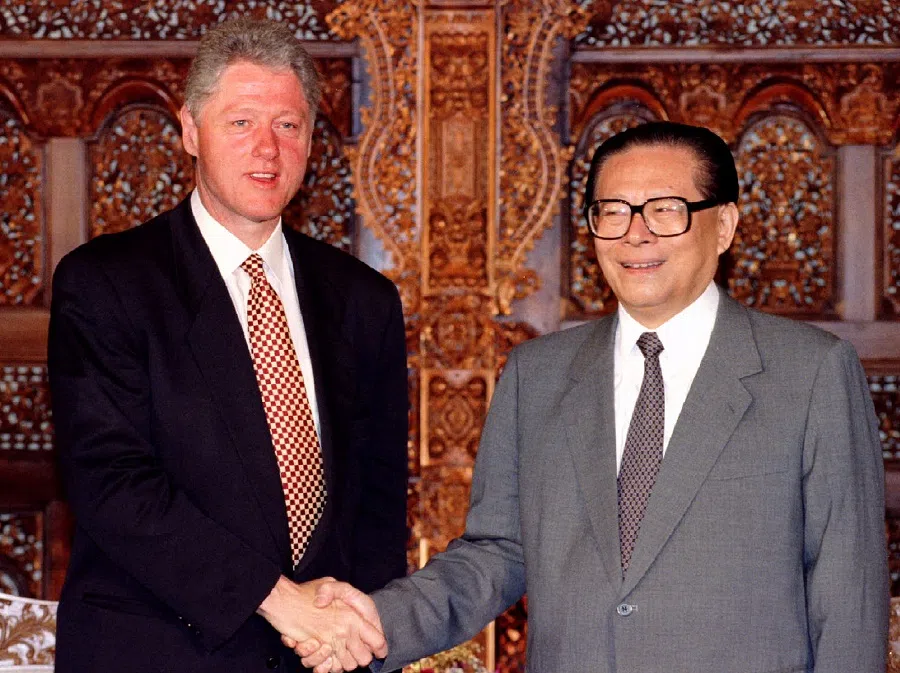
US ambassador to China Joseph W. Prueher (1999-2001), who was commander of the United States Pacific Command at the time, recounted Jiang's stopover in Hawaii, where some locals protested during a reception. Jiang reportedly bantered with Prueher, saying we were all like this "when we were young". Jiang also handled protests during the speech at Harvard diplomatically by joking that he had to speak louder to outshout the protestors.
President Clinton paid a return visit to China in 1998. It was during this visit that Clinton uttered the US's "Three No's" policy regarding Taiwan: not supporting independence for Taiwan; not supporting any solution that creates "two Chinas", or one China and one Taiwan; and not supporting Taiwan's admission to organisations where statehood is a requirement for membership, such as the United Nations. The "three no's" was considered a concession to Beijing and was criticised by many in Washington and Taipei.
While encouraging Western investments, Jiang also made the historic decision to welcome China's own businesspeople into the CCP.
Forward-looking and roping in businesspeople
Jiang Zemin's Three Represents - that the CCP represents China's advanced productive forces, China's advanced culture, and the fundamental interests of the overwhelming majority of the Chinese people - reflected his thinking that the party and the state should keep pace with the times (与时俱进)。
While encouraging Western investments, Jiang also made the historic decision to welcome China's own businesspeople into the CCP. This significant move reinvigorated the party and boosted China's thriving private sector. "Red capitalists" such as Alibaba's Jack Ma helped create China's economic miracles.
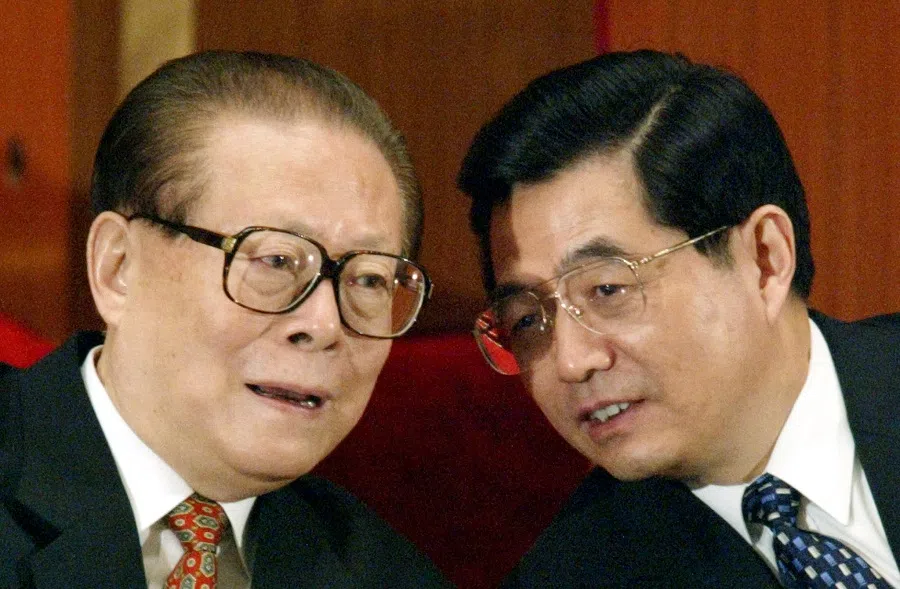
Starting in late 2002, Jiang handed over leadership titles to his successor, Hu Jintao, first as the party boss and then as president in 2003, completing the first orderly power transfer in the PRC. However, he retained his central military commission chair position until 2004 and, even after his official retirement, continued to exert political influence from behind the scenes, including over the selection of current leader Xi Jinping.
Notably, Jiang was one of the few Chinese leaders who were willing to interact with journalists.
Other notable achievements of China during Jiang's tenure include regaining sovereignty over Hong Kong, weathering through the 1997-1998 global financial crisis, winning the bid to host the 2008 Olympics in Beijing and perhaps most importantly, joining the WTO in 2001.
Willing to parry with the press
Notably, Jiang was one of the few Chinese leaders who were willing to interact with journalists. He seemed to enjoy such interactions and generally performed well, often with a flair. His flamboyant personality sometimes surprised his hosts. During foreign trips, he would occasionally burst into singing, play musical instruments, or recite famous poems and speeches.
Of the many interviews he conducted, he seemed to enjoy the one with CBS's Mike Wallace in August 2000 the most. When challenged that he was not an elected leader, Jiang defended himself by saying that he was elected in a Chinese style of democracy.
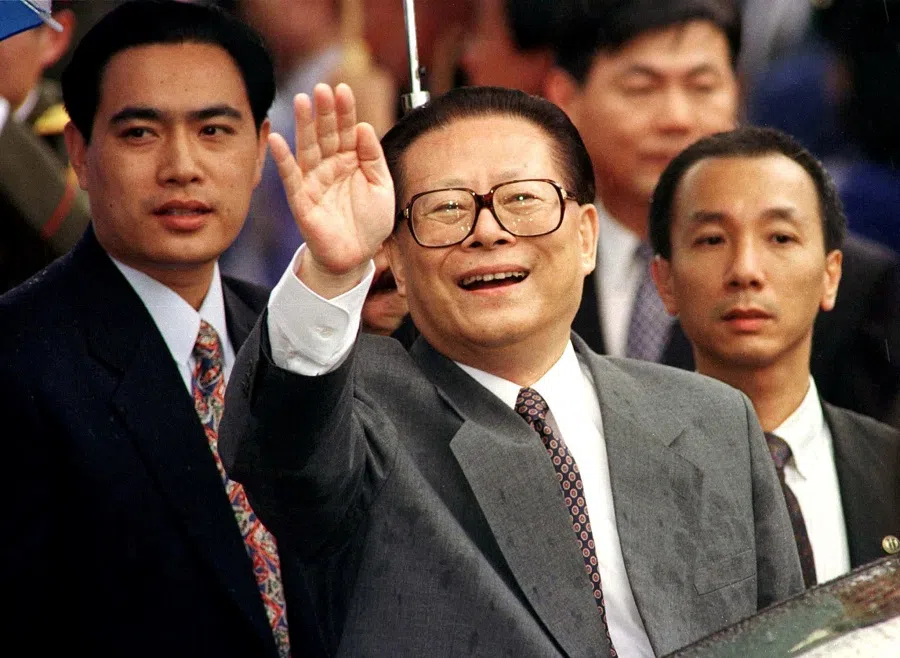
He chided Hong Kong journalists for being "too simple, sometimes naïve". But many agree that the political atmosphere was relatively open under Jiang, and some would suggest the 1990s as the golden era for Chinese journalism.
Though they may disagree with his policies, many world leaders remember Jiang fondly. UN Secretary-General Antonio Guterres called Jiang "a steadfast advocate for international engagement" and recalled his "personal warmth and openness". Bill Clinton in his memoir said Jiang was "intriguing, funny and fiercely proud".
Rampant corruption was perhaps one of the biggest failures, especially with the Chinese military's involvement in businesses...
Shortcomings in retrospect
Like other historical figures, Jiang also had failures or shortcomings in his political career. Rampant corruption was perhaps one of the biggest failures, especially with the Chinese military's involvement in businesses, which not only contributed to corruption overall but also severely damaged the PLA's morale and image. Today, corruption remains a challenge to the party's rule.
Jiang's administration did not do much to protect the environment either, with a heavy focus on GDP growth. Now China is paying the hefty cost as the biggest polluter and largest greenhouse gas emitter.
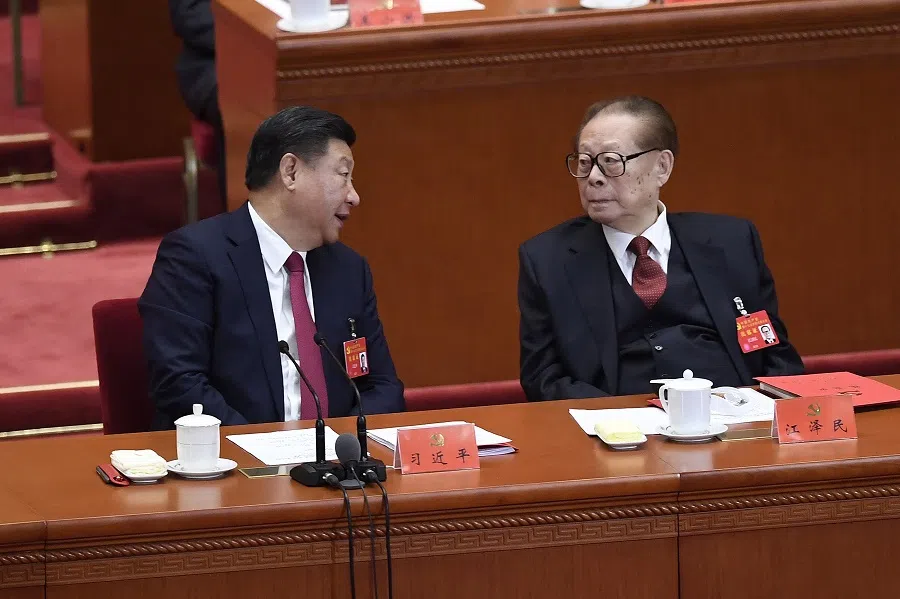
Jiang touted the benefit of "everyone making a fortune quietly" (闷声发大财) while emphasising the one-party rule instead of political reform. The crackdown on Falun Gong showed his intolerance towards challenges to party dominance. Maintaining stability (维稳) was introduced as a strategy to protect the peaceful domestic environment for economic development, but it was often abused to clamp down on dissent, including tightening censorship.
Undoubtedly, Jiang has a mixed legacy and people will have divergent views of him. But Jiang's passing will have no major political repercussions in China today. Unlike Deng's passing in 1997 which helped Jiang to step out of Deng's shadow and lead with more confidence and style, today Xi Jinping is in firm control of Chinese politics and foreign policy. For ordinary Chinese, Jiang would be remembered as a leader whose achievements far outweigh his shortcomings.
